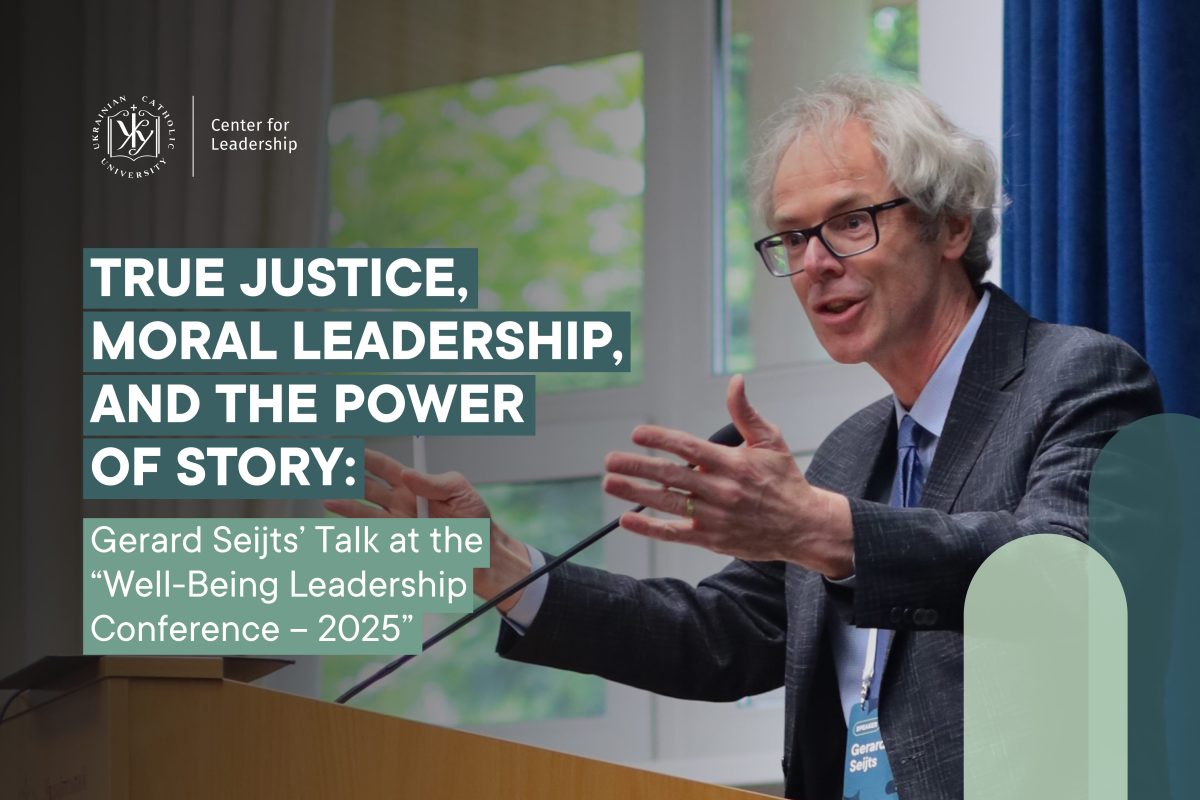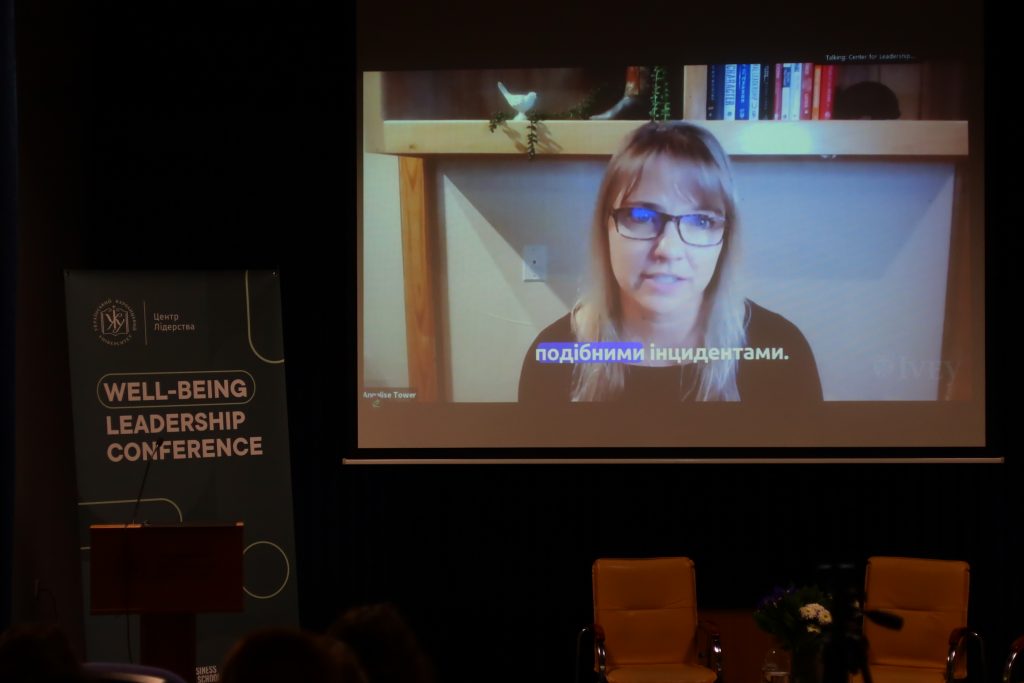
Moral Leadership in a Time of Wounded Souls
Lviv, May 23, 2025. The final segment of the 3rd International Scientific and Practical “Well-Being Leadership Conference” opened with a remarkable conversation – an interview between Professor Gerard Seijts of the Ian O. Ihnatowycz Institute for Leadership at Ivey Business School and Annalise Tower. A former member of the Canadian Armed Forces, a mentor in the Character Leadership Program, and a volunteer in Ukraine – but also a survivor of deep moral injury, and someone who has walked a long road toward healing.
This was neither a lecture nor an abstract theoretical reflection. It was a profound testimony, interwoven with pain, silence, shame – and, ultimately, transformation. It became the emotional and intellectual culmination of a conference devoted to moral Leadership in an age of collective trauma. And it was a powerful message to Ukrainian society – one we wish to revisit and share with our readers, a month after the event.
Moral Injury as a Collapse of the Self
Gerard Seijts is one of the co-authors of the Leadership Character framework used by the Center for Leadership of UCU. In addressing the challenges facing modern Leaders, he drew the audience’s attention to a key element of deep healing: the right to be heard. From this starting point, he introduced the story of Annalise Tower – as an example of moral Leadership through vulnerability.
In sharing her story, Annalise described moral injury not as a single traumatic event, but as a prolonged experience within a toxic system – one where systemic sexual violence and the indifference of commanders had become normalized. She recalled how, for years, she told herself that “nothing really happened”, that “this was normal”. Her sense of dignity was gradually eroded.
“I believed that I was nothing more than garbage, and that I deserved everything that happened to me”,
the heroine of the story shared.
And in that very feeling lies the essence of moral injury: the destruction of one’s inner compass, the loss of identity, the collapse of meaning – and, ultimately, self-blame, isolation, and silence. In this sense, moral injury differs from physical or even psychological trauma. It is about the betrayal of core values – the rupture of what might be called a “moral contract” with reality. And that is precisely what makes it so devastating.

The Role of a Leader: Creating Space for Truth
The Canadian scholar posed a clear question to the conference participants: What is a Leader to do when surrounded by morally injured people? His answer: to be present. To create a space of Trust, where it is possible to say: “I believe you”. Not to deny, not to verify, not to ask questions – but to believe. To be there. Not to try to “fix” the pain, but to acknowledge its right to exist.
“[For me, the turning point came when I first spoke to a police detective.] She simply said: “I believe you” – and it felt like a weight was lifted. My story was safe. And we – we are our stories. If our story isn’t safe, then we ourselves can’t be safe either”,
Annalise Tower recalled.
Thus, believing in a person is already an act of moral Leadership. And it is precisely this kind of resource that Leaders – in organizations, communities, and institutions – not only can, but must cultivate.
The GAP Model: Three Pillars of Recovery
Among the tools that helped Annalise on her healing journey, she highlights the so-called GAP model – a simple yet effective framework that encompasses three key steps of internal recovery:
1. G – Gratitude:
Despite pain and trauma, a person can always choose something to be grateful for. And that is the first step toward reclaiming joy and meaning.
“I heard someone say that gratitude is the path to joy. And I truly believe that”,
speaker shared.
2. A – Acceptance:
Life includes pain, loss, and hardship. Accepting this fact allows us to stop fighting reality – and start to transform it.
3. P – Perspective or Patience:
This is the ability to choose what we focus on: either the loss or the opportunity to grow. It is also a reminder that healing is a process that takes time – and does not come with “quick fixes”.
For Annalise, this model became a kind of moral compass.
“I had to learn to be patient. There were days when I could only live one minute at a time. But I knew I was moving in the right direction”,
she reflected.
True Justice: More Than a Verdict
One of the most painful moments in her story was the reaction of the military after the conviction of her abuser. Following his sentencing for sexual assault, senior officials in the Canadian Armed Forces wrote letters in his defense to request a lighter sentence. For Annalise, this became “another moral injury on top of the one I had already suffered”.
Her conclusion is not just relevant to the Canadian military. It is universal: when it comes to addressing moral injury, it’s not only about individual perpetrators – it’s about entire systems and cultures that protect them. And fail to support survivors.
That is why Annalise introduces the concept of “true Justice”. Justice, in this deeper sense, is not only about legal punishment. It is about the restoration of connection, public recognition, and dignity.
“Justice is when you are seen. When your story is acknowledged as real. When you feel like you belong”,
the public figure explained.
Ukraine’s Experience: A Mirror and a Reminder
The final part of the interview shifted the focus to Ukraine. At the onset of the full-scale war, Annalise Tower – together with other volunteers from the “Hungry For Life International” initiative – came to Ukraine to support friends and colleagues. That experience only deepened her understanding of the power of story and connection.
“I saw it in the eyes of the refugees: they just needed to tell their story – and to have someone believe them. It was as if it gave them permission to breathe again”,
the heroine of the interview emphasized.
Despite the language barrier, she remained present, listened, and believed. As she put it, “People are made for connection. And moral injury is a painful severing of that bond”. That is why the restoration of connection – within a Community – is a foundational element of healing.
Takeaways for Leaders: From Trust to a Space for Healing
The final question posed by Gerard Seijts was addressed to everyone who has taken on the burden of Leadership: “How can we create a safe space where people feel able to tell their stories – openly and without defensiveness?”
And perhaps, we already have the answer:
1. A safe space begins with trust.
“I believe you” – these may be the most powerful words a Leader can say to someone who has experienced moral injury. Unconditional belief is an act of Leadership that restores dignity.
2. Moral injury is not only about events – but about culture.
Systemic dismissal, silence, and indifference to pain are no less damaging – and sometimes even more so – than acts of violence themselves. Our task is not only to stop wrongdoing, but to create a culture in which it becomes impossible.
3. Healing requires connection.
Recovery after moral injury does not begin with action, but with the presence of another human being – someone who listens, stays, and doesn’t look away. And the Leader is precisely the one who creates such spaces of support.
4. Real Justice means belonging.
“Justice is when you are seen and your story is acknowledged. When you feel like you belong again”,
Annalise Tower affirms.
Legal judgment matters. But true Justice is the restoration of a person’s sense of worth and dignity.
5. Post-traumatic growth is possible.
The GAP model (Gratitude – Acceptance – Perspective / Patience) teaches us to:
- practice gratitude, even in the darkness;
- accept loss as part of the journey;
- embrace patience as a quiet form of strength.
It is not an easy path – but it is real. And our task as Leaders is to walk it alongside others, helping them move forward.
“If we want to be leaders who heal – not harm – then let us begin by simply being present. Without fear. Without judgment. Just with the kind of presence that heals”,
Gerard Seijts concluded.
In the end, can it be any other way in the 21st century? In an age of unprecedented progress – and deep vulnerability; global connection – and crushing loneliness? A time in which the world faces a profound Leadership crisis, and yet only Leadership – authentic and human-centered – can offer a true response to the challenges of our time?
This talk, then, stands as a clear reminder: Modern Leadership is not only about competence. It is about moral courage – the courage to stay with people in their pain. Because this is how a culture of Trust is built. And this is where Healing begins.